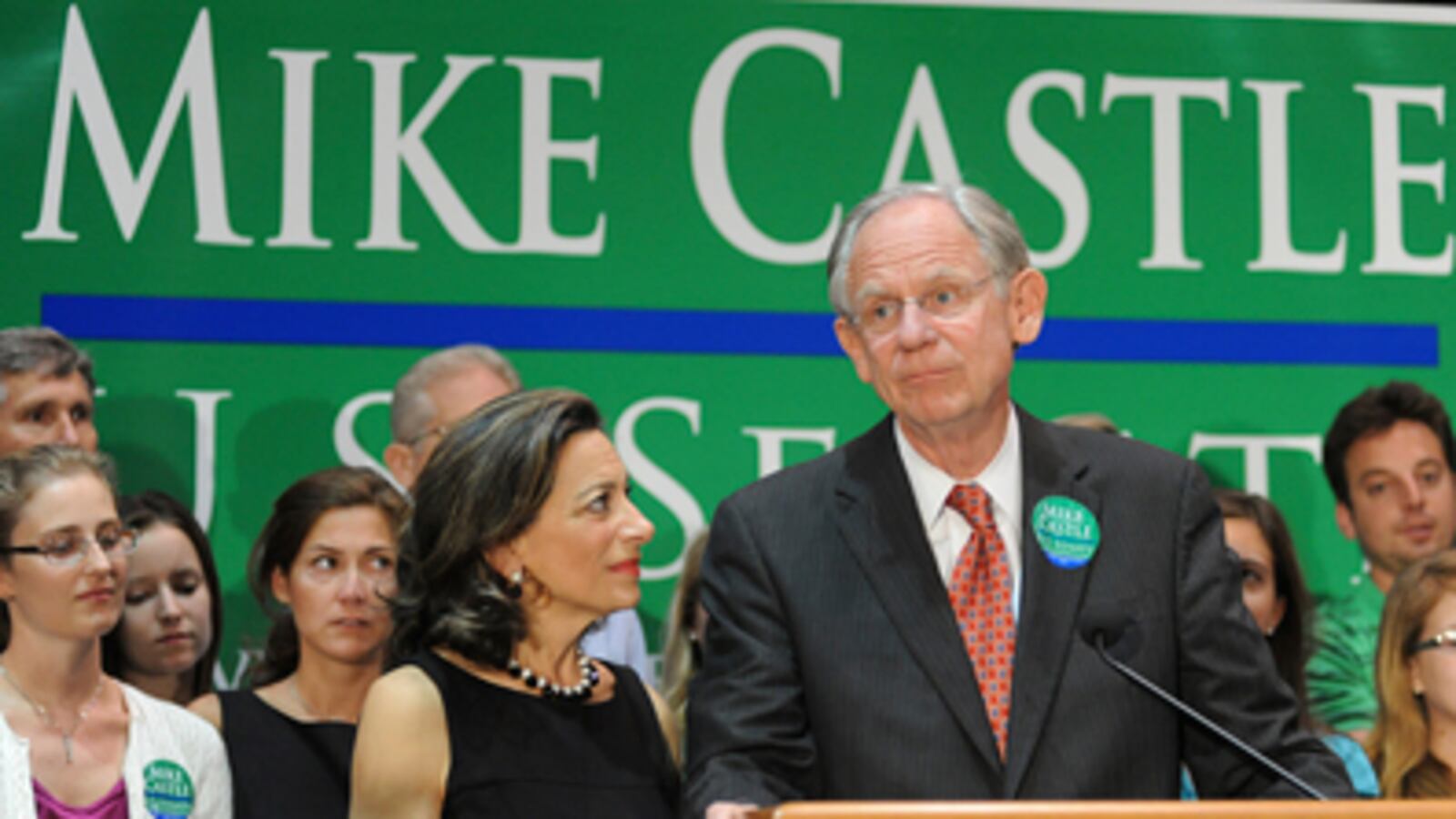A recurring kind of obituary keeps turning up in the newspapers’ political pages. The most recent crime scene: Delaware’s Republican Senate primary. The killer: candidate Christine O’Donnell. The victim: Rep. Mike Castle, a man voted into nearly every office available in Delaware since 1966. The eulogies are going out not just for Castle but for an entire brand of Republican politics, which is dying on the vine.
The Washington Post’s E.J. Dionne captured the mood: “Castle’s defeat at the hands of Christine O’Donnell, a perennial candidate who may be the least qualified Senate nominee anywhere in the country, does indeed mark the collapse of the Republican Party not only of Nelson Rockefeller and Tom Dewey but also of Bob Dole and Howard Baker.”

The funeral for moderate Republicanism has now spanned generations. The GOP’s dwindling Rockefeller Republican caucus was wringing its hands back when Ronald Reagan was elected president, but the pace of extinction is accelerating. The squeeze on the middle appears at its all-time worst. In the past decade, the ranks have been thinned. The weekly lunches at the Capitol of moderate Republicans could fill a large table: At some points, 10 members of the Republican Party would have been comfortable at the gatherings, including Lincoln Chafee, Arlen Specter, Jim Jeffords, Jim Leach, Rob Simmons, and Charlie Bass. Now the remaining moderate Republicans in the Senate all hail from New England and number three—on a good day.
• Daily Beast contributors on the primary results• Kirsten Powers: Stop Mocking the Tea Party!• Shushannah Walshe: Palin’s Wins Stoke White House Run• Benjamin Sarlin: Guess Who’s on Christine O’Donnell’s Payroll? As dark as this picture is for congressional candidates, there’s bright news at the state level. Somehow, moderates are holding their own in governor’s races—and some of the party’s biggest rising stars are centrists in the statehouse ranks.
If Sarah Palin and Jim DeMint are the patron saints of hard-right anti-establishment types, Mississippi Gov. Haley Barbour is their counterpart in the center. The wily head of the Republican Governors Association, a possible contender for president in 2012, preaches a big-tent philosophy that contrasts sharply with the ideological purification drive on the right.
“There are tens of millions of pro-choice Republicans that are just as good Republicans as I am, and we need to support them,” Barbour said last summer. “That’s what party building is about, and don’t think that is giving up your principles.”
“Will there be some babies thrown out with the bathwater, if you will?” Republican strategist Ron Kaufman says. “Yes, that is unfortunate. But I wouldn’t change it because of all the excitement on our side.”
The casualty list of moderate Republicans has grown substantially this election season. Mike Castle is just the latest. Last month, Republican Sen. Lisa Murkowski was felled by a renegade attorney named Joe Miller, who rode Palin’s endorsement to one of the most stunning upsets in state history. (Murkowski will decide by Friday whether to mount a write-in campaign in a last-ditch bid to hold on to her seat.) Sen. Bob Bennett blamed his failure to rant on conservative cable outlets for his defeat at the Utah state GOP convention this spring. Pennsylvania Sen. Arlen Specter was so frightened by the fringe that he ditched the Republican Party for good and became a Democrat, only to lose in the primary. Florida Gov. Charlie Crist, too, left the GOP, as he watched his chances of fending off a conservative challenger for a Senate seat fade; now an independent, he is struggling to stay competitive.
Since the health-care negotiations, even Maine—widely seen as the centrist GOP’s last redoubt—may be trending rightward. Republican Sen. Olympia Snowe, a much sought-after crossover vote by the Democratic White House, has long been one of her state’s most popular political figures. Now, two-thirds of Maine Republicans say she is too liberal for their taste.
Asked for a complete list of notable middle-of-the-road Republican leaders, Lou Zickar of the Ripon Society, a centrist group named for the birthplace of the Republican Party, mentioned a number of candidates, including someone who appears on a lot of lists of American’s most impressive moderate Republicans. Unfortunately, for the GOP, that politician, Utah’s John Huntsman, lives outside the United States as President Obama’s ambassador to China.
There may be an exodus of Rockefeller Republicans on Capitol Hill, but moderates are faring a little better in the governor’s mansions. Indiana Gov. Mitch Daniels and New Jersey Gov. Chris Christie are both rising stars in the party. Christie, who took office in January, has earned praise for slashing the cost of government employee benefits and state pensions. Just this week, Daniels rode his motorcycle into the pages of Newsweek, where he was praised for his fiscal restraint and competent governing. The anti-Washington mood makes the governor’s ranks the most promising springboard for 2012 candidates (even if Daniels has plenty of D.C. experience on his resume).
Similarly, a couple of gubernatorial candidates hold promise for those looking to put the centrist Republican band back together. Thanks to a bottomless war chest, California’s Meg Whitman was able to hold off more conservative Republican candidates in the party’s gubernatorial primary. For now, she holds a slim lead over Democratic veteran Jerry Brown. In Michigan, Rick Snyder, the former Gateway executive best known for his “One Tough Nerd” ad campaign, clinched his party’s primary, despite attacks that he was too liberal for Michigan Republicans. He looks like a shoo-in come November.
And there are two bright spots in Washington. Ironically, the Tea Party, which has fueled the defeat of several moderates, helped elect centrist Republicans’ biggest star. Scott Brown’s upset victory in the race for the seat held by the late Ted Kennedy remains a major coup for the party’s middle. There is also the expectation that Republican Rep. Mark Kirk will take over Barack Obama’s former Senate seat in Illinois, which would be another important win for the center.
As a result, the Ripon Society and its fellow travelers aren’t throwing in the towel just yet. “On Nov. 3, two of the biggest victories for Republicans in 2010 could have been won by centrists,” Zickar says.
It won’t be easy to keep them in the win column. For the moment, Brown is the most popular elected official in his home state. But he made it into office in the first place thanks to the support and generous donations of groups like the Tea Party Express—and his record since taking office, and willingness to back a few key Democratic bills, has only alienated those groups. He’s up for reelection to a full term in 2012, and it’s not at all clear that the coalition that swept him into office will hold together then.
Ron Kaufman, an informal adviser to Brown and former Massachusetts Gov. Mitt Romney—who is mounting another run for the White House—is watching the currents closely. Romney’s political career offers a leading example of the magnetic pull of the GOP’s right wing. But Kaufman says the momentum from the party’s right is worth the risks it might pose to candidates who hew toward the middle.
“Will there be some babies thrown out with the bathwater, if you will?” he says. “Yes, that is unfortunate. But I wouldn’t change it because of all the excitement on our side.”
Clarification: As originally written, the story inaccurately gave the impression that Zickar named only one candidate. In fact, he discussed most of the candidates named in the article.
Samuel P. Jacobs is a staff reporter at The Daily Beast. He has also written for The Boston Globe, The New York Observer, and The New Republic Online.





